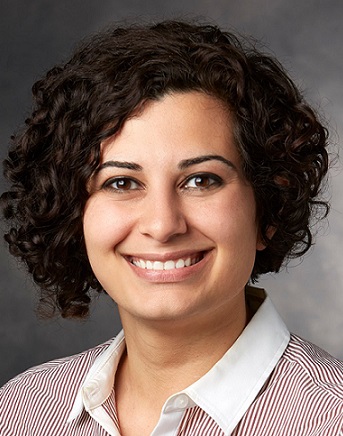
Duaa Al-Rawi, MD, PhD
Investigating the Role of Chromosomal Instability in Ovarian Cancer Initiation
2026 Early Career Investigator Grant
Memorial Sloan Kettering Cancer Center
Project Summary
We are studying the earliest events in ovarian cancer development in the fallopian tubes. By examining the pre-tumor ecosystem in patient tissues and using a specialized mouse model, we aim to define the transitions from pre-cancer to invasive ovarian cancer. Our goal is to find features that predict which patients are at higher risk and may benefit from early treatment and to better understand the origins of ovarian cancer.
Bio
Dr. Duaa Al-Rawi is a gynecologic medical oncologist specializing in ovarian, endometrial, and cervical cancers, with a research program focused on earlier detection and prevention of ovarian cancer. She is dedicated to pairing rigorous science with compassionate, individualized care for patients facing the medical and emotional burdens of a cancer diagnosis.
Dr. Al-Rawi first became drawn to oncology during her PhD at the Koch Institute for Integrative Cancer Research at the Massachusetts Institute of Technology, where she studied the biochemical functions of cancer predisposition genes, including BRCA1. Her exposure to physician-scientists and their patients shaped her commitment to a career that bridges mechanistic discovery and clinical impact.
She completed medical school at Stanford University followed by an Internal Medicine residency, where she developed a strong affinity for caring for women with cancer and chose to specialize in gynecologic medical oncology. She pursued medical oncology fellowship training at Memorial Sloan Kettering Cancer Center (MSK), one of the few centers where medical oncologists concentrate on gynecologic malignancies, and she considers it a privilege to care for patients with these diseases.
Her research is centered on serous tubal intraepithelial carcinoma (STIC), a precursor lesion within the fallopian tube that is a precursor of high-grade serous ovarian cancer. By applying single-cell sequencing and spatial transcriptomics, she studies how STIC lesions transition toward invasive disease and seeks biomarkers that could enable improved monitoring, earlier diagnosis, and more personalized risk assessment. Long term, Dr. Al-Rawi aims to define the earliest, rate-limiting steps that determine whether a STIC lesion remains indolent or progresses to invasive cancer, and to translate these insights into clinically actionable tools—specifically tissue-based biomarkers—to enable risk stratification and personalized interventions for individuals at highest risk.
Past OCRA Grants
Dr. Al-Rawi was a recipient of OCRA’s 2023 Mentored Investigator Grant for her project, “Examining the Early Events in Fallopian Tube Transformation.”
This grant was made possible in part by generous donations from George and Paulette Collias in memory of Matina, Georgiana & Cindy Gatziolis; Ovarian Cycle Massapequa, in memory of Diane Mahlstadt; and Toasting to Teal in memory of Margaret Harrison.